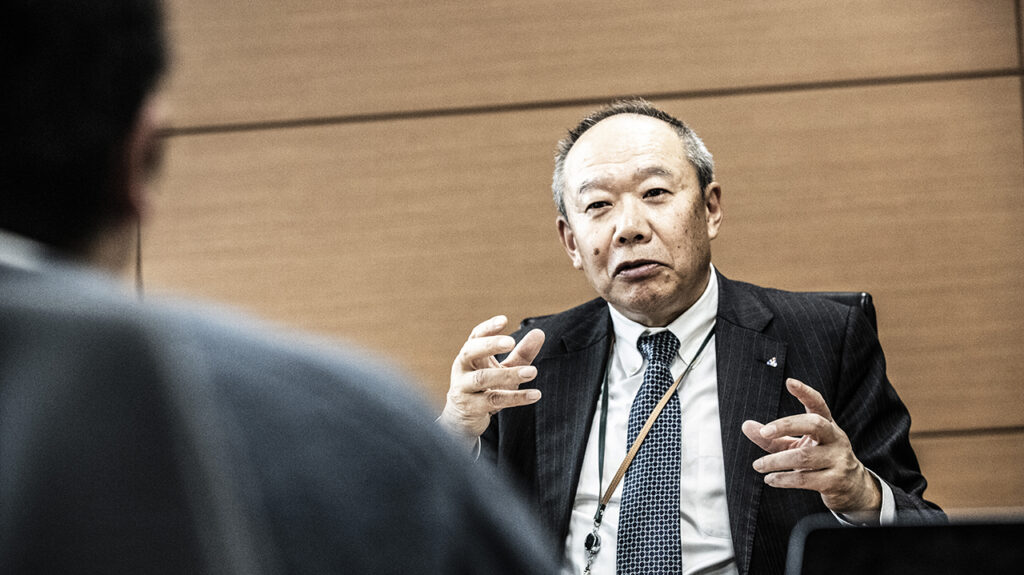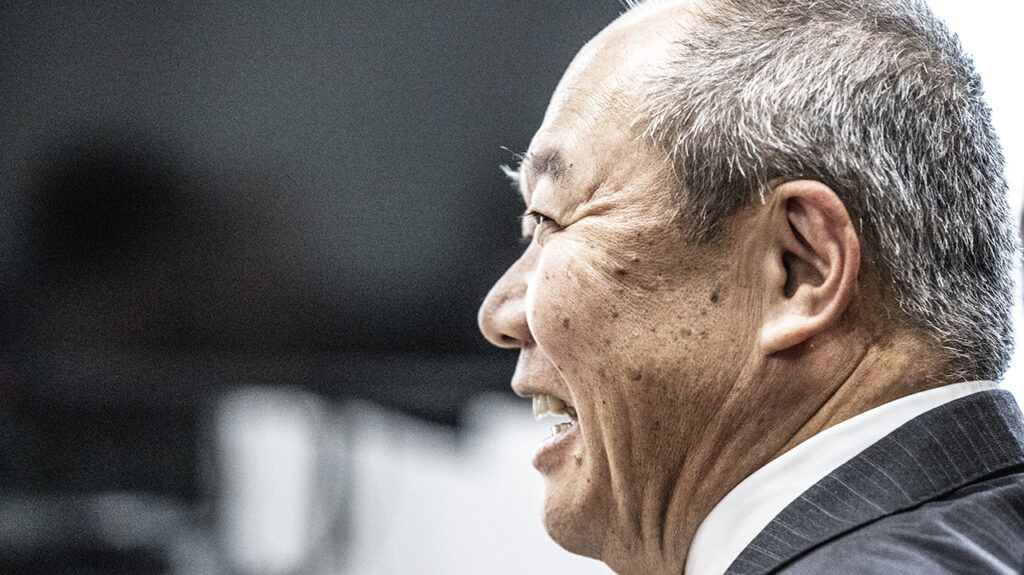If we can build a consensus among the Japanese people that "forests are wonderful," a "circular forest economy "can be established
Updated by Tokuyama Corporation on May 21, 2025, 2:37 PM JST
Tokuyama Corporation
Tokuyama Corporation is a general chemical manufacturer founded in 1918 in Tokuyama-cho (now Shunan-shi), Yamaguchi Prefecture. Currently, the company's main businesses are chemical products (soda, chlor-alkali, chlor-alkali, vinyl chloride), cement (cement and resources), advanced electronic materials (high-purity polycrystalline silicon, high-purity IPA, silica, high-purity aluminum nitride powder), life sciences (fine chemicals, microporous films, dental equipment, diagnostics), and environmental business (waste recycling, ion exchange membranes, etc.). Environmental business (waste recycling, ion-exchange membranes, etc.) are the company's core businesses.Official Site
Tokuyama Corporation was founded in 1918 in Tokuyama-cho, Yamaguchi Prefecture (now Shunan City) with the aim of domestically producing soda ash, which at the time was dependent on imported products. Currently, the company is engaged in chemical products (soda, chlor-alkali, chlor-alkali, vinyl chloride), cement (cement and resources), advanced electronic materials (high-purity polycrystalline silicon, high-purity IPA, silica, high-purity aluminum nitride powder), life sciences (fine chemicals, microporous films, dental equipment, diagnostics), and environmental business (waste recycling, ion exchange membranes, etc.). The company has grown into a comprehensive chemical manufacturer with core businesses in life sciences (fine chemicals, microporous films, dental instruments, diagnostics) and environmental business (waste recycling, ion exchange membranes, etc.). We interviewed Hiroshi Yokota, president of the company (appointed as representative director in 2015), about his thoughts on the "forest circular economy.
We (the Tokuyama Group) are a chemical company, and chemistry (chemical) uses a lot of energy, and the raw materials are all fossil fuels, such as oil, coal, and natural gas. It is such an industry. However, everything in the world is made of chemicals, so society would not exist without this industry. Biomass is also a natural chemical. The idea that chemicals are evil and that we should stop using plastics is too violent. Fossils are made over hundreds of millions of years. Trees, plants, and living things became oil or coal. So why wait until they become fossils? This is our basic way of thinking.

The other keyword is sustainable. If the speed at which biomass in general grows meets the speed at which we use it, it will be sustainable. As long as we are able to use the carbon that grows on the earth by absorbing carbon dioxide, in other words, as long as we are able to use it as a raw material in various ways, that is, as long as it (is) a growing material, we will only need to use the amount that grows each year, which means that we can continue to use it for as long as we calculate. Many people are mistaken, but oil and coal are all biomass.
If you want to use fossils, all you have to do is wait a few hundred million years. But that doesn't fit the time frame. If plants fix carbon on the earth and use the fixed carbon as a raw material, we can use it sustainably for a long time as long as it grows in one year. In short, oil and coal are hydrocarbons. Plants are also a mass of C and H. It is important that this use makes sense. We are talking about whether it is in a form that fits the balance on the earth. The basic idea is to use the growth of biomass and see if we can't make it work within that range. This is the first point.
The other thing is that we have learned (as we did) that Japan is a country without resources. From elementary school onward. From childhood, we were taught that Japan would become rich by bringing resources from overseas, adding value through processing trade, and exporting them to those who need them overseas to make money. But if you think about it, trees grow like mountains in Japan. From Hokkaido to Kyushu and Okinawa. As you can see when you get on an airplane, it is no exaggeration to say that Japan is made only of forests. What the teacher said was a lie (laughs).
We actually have resources, but we have not been using them, or rather, we have not recognized forests as resources. Before the war, forestry was a very important industry, but after the war that has completely changed. And if you think about it, that idea does not make sense. Not many countries are as hot and humid as Japan. In other countries, once trees are cut down, they do not grow back. In neighboring Korea and China, bald mountains are hard to restore. But in Japan, they grow back even after being cut down. Fortunately or unfortunately, Japan has many typhoons and a rainy season. It is unusually hot these days, but we also have hot and humid summers. With such a blessed environment, there is no way not to make use of this treasure.
Looking back at the history of Japan, it is said that grandfathers went to the mountains to mow the lawn and grandmothers washed their clothes in the river. Symbiosis in relation to nature has always existed with forests. There is no doubt that maximizing the use of these forests is in the national interest. Conversely, if forestry and agriculture are not seriously restored now, Japan will not be able to survive into the future.
The other is "regional creation," which Mr. Ishiba (the 102nd and 103rd Prime Minister) has also been actively advocating. The old "hometown creation" of Mr. Takeshita (the 74th Prime Minister) only ended with the creation of many strange objects. The reason for his failure was that he could not create jobs. Regional creation is, after all, about industries in various regions. Unless we can create an environment where people have jobs and a sense of fulfillment in their lives, there is no such thing as regional development. Therefore, it is very important to have agriculture (food) as the base and forestry as the proper industry. If people gather together through proper agriculture and forestry, many things will happen in a chain reaction. This should be a national movement to design a new Japan. And it depends on whether or not the Japanese people can truly understand the importance of this movement.

Wood is very flexible and is such an excellent material that buildings in Nara and Kyoto have lasted beautifully for hundreds of years. The parts that are not used for lumber are used for chemical raw materials and biomass chemistry. Roots, leaves, bark, and other materials that cannot be used for biomass chemistry, but are difficult to use because of their various components, can be used as fuel for firewood and biomass power generation. In any case, use everything up. Do not waste anything. The word "disposable" is the worst. There is nothing in this world that can be thrown away. If we use everything effectively, we can create a recycling-oriented society in Japan. As Dr. Komiyama (Chairman of Platinum Network for Sustainable Development) mentioned, the annual growth rate of Japan's forests is 140 to 170 million cubic meters. If we can properly recycle and use the plastics made from these forests, not only plastics but also construction materials will be recycled.
Then who is actually cutting the trees? The reality is that there are mountains of private forests with no clear boundaries. "That mountain is mine," "How far is it? "It must be around there. There must be a marker there. Unless they cut down trees on a certain scale and plant trees there, it is not economically feasible. In order to do that, we have to solve things like the land registry being unknown and what to do with these things. One of the guys at our plant has an employee who owns a mountain. He says that it used to be a matsutake mushroom mountain, but now it's not done at all. That's because they don't take care of it. When they tell the city government that they don't want it and will return it, the city says no. They don't want it because they don't get any tax money. Because they don't get any tax money. What a stingy thing to say. Why don't they just put them all together and think about using them effectively?
When we were children in the 1960s and 1970s, pollution and destruction of nature were problems. It was instilled in us that cutting down trees was a sinful thing to do. Such a mood still exists in Japan as a whole. Of course it is not good to cut down trees unnecessarily, but if they are managed properly, there are actually many good things for the people. Those who simply own the mountains should either give them up to young people who want to make effective use of the forests, or leave the care to them. There is a limit to the amount of subsidies that can be given. If we can build a consensus among the Japanese people that forests are wonderful, a "circular economy of forests" can be established.
We are thinking of starting with the area where our factory is located. We are talking to people from the city, the prefecture, and the forestry cooperative, saying, "We have this idea. Basically, there are no rejections. It is important that the public thinks it would be better to proceed. Without that kind of foundation, people will think, "Isn't this just a chemical company talking about what suits them?" If this is not the foundation, people will think, "Isn't the chemical company just talking for its own convenience? Unless the local governments and ultimately the national government try to make this a national policy, I don't think it will ever progress. That is why we formulated the "Policy for Sustainable Forestry" in April of this year.
The Tokuyama Group has established the Tokuyama Group Sustainable Forest Policy based on the Tokuyama Basic Principles of Sustainability to ensure that the value of forests (timber production, water source function, soil conservation on slopes, breeding grounds for wildlife, etc., including bamboo and palm species) is sustainable. In order to ensure the sustainability of forests (including bamboo and palm trees), we have established the "Tokuyama Group Sustainable Forest Policy" based on our "Basic Principles of Sustainability" and all executives and employees of the Tokuyama Group are required to comply with the policy. Specifically
We are not involved in deforestation or illegal logging.
Only sustainably and properly managed forest resources are handled.
Make effective use of burned trees, fallen trees, driftwood, etc. damaged by natural disasters.
Contribute to the sustainable development of forest-related communities.
We respect the human rights of all people involved in forestry and do not tolerate any discriminatory or prejudicial practices, child labor, or forced labor.
Respect the social and economic rights of indigenous peoples in their traditional lands and uses related to forests.
I don't say this because I am a chemical manufacturer, but plants fix carbon. Cooking rice with wood instead of burning the fixed carbon has been done for a long time, and to that extent is nothing to sneeze at. It doesn't fit with national policy to say this, but jet fuel, or SAF as it is called, is the same as drilling for oil. Making fuel from wood and burning it just goes back to carbon dioxide again.
Our concept is to take the carbon and hydrogen absorbed by the plants and fix it in a different form. We also recover and return discarded materials. We recycle fixed materials as they are fixed. This is the part that is difficult to understand. Those who advocate against plastic say that plastic is bad because the oceans are full of microplastics, which are causing a lot of problems. However, the essential problem is not the plastic itself, but the human act of disposing of it and scattering it around the earth as garbage. I am sure that in the future we will have a society where people will be fined if they throw away plastic. But the truth is, we need a system in which people don't throw things away, but instead properly dispose of them at home or in companies and use them again. If we do this, the trees we cut down will be recycled more and more. The products made from the growth will be used two or three times. How can we create such a society?
The world has changed from a world of use and throw away to a world of recycling, but in reality, according to the statistics for 2023, only 251 TP3T of the total amount of plastic is carbon sequestered and reused, with 22% recycled (material recycling) and 3% used as chemical raw materials (chemical recycling). The Tokuyama Group is also working on this. The Tokuyama Group is also doing this, but it would be a waste if we threw away the materials that have not been sorted, so instead of drilling for oil or coal, we are using them as fuel. Not everything can be recycled, so what cannot be recycled is used in some form. However, Japan is basically good at recycling. Of the waste plastic, 90% can be recovered and reused, including use as fuel. There is no other country in the world like Japan. It is just that they do not have a recycling system in place. At the very least, there is no country that has a system for collecting waste plastic, so in that sense, I think Japan is the closest country to recycling.

When I give a lecture in town, I tell people that they should be happy that they are participating in something, even if it is just a piece of garbage, and that they are doing something useful. We tend to think of it as an extension of our work, and we tend to think that we want to turn it around quickly and make a business out of it. We want to make the raw materials turn around quickly, and to that end, we lack the perspective of having each and every citizen participate and feel joy. My father was also in the forestry industry. As an employee of the Forestry Experiment Station, he studied tree diseases. I also grew up going to the mountains with my father to pick mushrooms. I have an affinity with trees. I did not grow up in the city. Wooden houses are being reevaluated, and I think Japanese people have an intrinsic affinity and affinity for wood. Wood, with its low thermal conductivity, gives a sense of warmth. Wood breathes, so it does not easily condense like concrete. Above all, wood makes for safe structures.
In the end, it comes down to a chain of materials. The Tokuyama Group is also considering carbon neutralization of fuels in various forms, including blue ammonia and green ammonia. The most difficult part is to decarbonize the raw materials, or carbon neutrality. Carbon neutralization of raw materials is difficult due to cost issues and the limitation that not all timber is easy to use for chemicals. However, we are convinced that this could be the most effective way to achieve this in Japan. We are currently buying and burning the unusable dregs from palm plantations in Southeast Asia, but if we start using them in our own country, they will no longer sell them to us. We need to be prepared for that moment now. (Discussion)
The book of the same title as this web media, "Forest Circular Economy" (edited by Hiroshi Komiyama) was published by Heibonsha on August 5, 2025. The book proposes a redesign of the economy, institutions, and local communities based on the three pillars of biomass chemistry, wooden cities, and forestry innovation in the cycle of "cutting, using, planting, and nurturing" forests. This practical book provides a point of contact between concepts and examples for those involved in policy making, social implementation, and the creation of businesses that make use of local resources.
View on Amazon